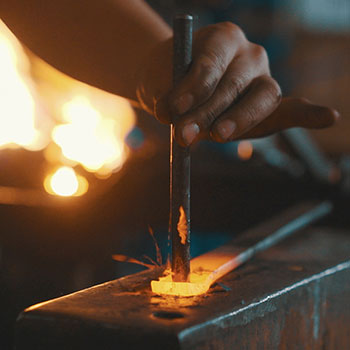The Magic of Glass and Metal
DMSE reopens its renovated glass lab, forge, and foundry.
Video and photo by Lillie Paquette; Written by Rachel KemperToday, the Department of Materials Science and Engineering (DMSE) celebrates the reopening of the W. David Kingery Ceramics and Glass Laboratory — formerly known as the MIT Glass Lab — and the Merton C. Flemings Materials Processing Laboratory, home to MIT’s forge and foundry.
Forge, foundry, and glassblowing activities were part of the department's Course 3 curriculum at MIT’s founding. For decades, MIT students have been given the opportunity to explore, understand, create, and learn while working with glass and metal. Until the renovation, however, the glassblowing and forge activities shared one room; the foundry was down the hall, in a cramped and dark space. Students now have more space for these activities, and new equipment has been added to allow more participation in classes at all levels. Improved safety and ventilation systems have also been added.
The renovation was made possible by a fundraising campaign that has raised nearly $3 million to date. A coalition of alumni and friends made gifts to name the Merton C. Flemings Materials Processing Laboratory, now home to the forge and foundry. Flemings ’51, ScD ’54, the Toyota Professor Emeritus of Materials Science and Engineering, established the foundation of modern solidification science and engineering, and made major contributions to industrial developments in metal casting. He mentored generations of students in foundry science, and was the founding director of MIT's Materials Processing Center. He also led DMSE during the evolution of its focus from metallurgy to much broader classes of materials.
“Hands-on laboratory experience is a vital part of all engineering education,” Flemings says. “The best laboratories provide students the opportunity to explore, invent, create and, often, to make real things.”
Thanks to the generosity of an anonymous donor, the former Glass Lab has been renamed for the late W. David Kingery ’48, ScD ’50, a pioneer in the study of ceramics whose research led to the use of ceramics in oxygen sensors, fuel cells, and a variety of electronics. Kingery received the Kyoto Prize in 1999, and died in 2000 at age 73.
